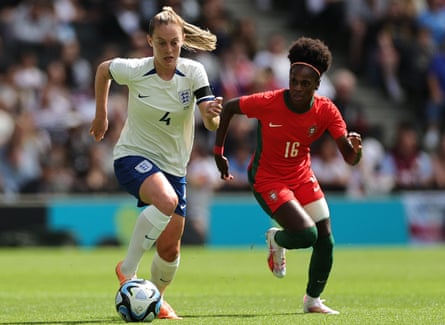This article is part of the Guardian’s Women’s World Cup 2023 Experts’ Network, a cooperation between some of the best media organisations from the 32 countries who qualified. theguardian.com is running previews from two countries each day in the run-up to the tournament kicking off on 20 July.
Overview
England travel to Australia and New Zealand as Euro 2022 winners, intent on global domination. Crucially, Sarina Wiegman’s side understand the perils of more haste less speed and will remain patient as they endeavour to win a first Women’s World Cup.
They also harbour few fears about shape-shifting from their preferred 4-3-3 or 4-2-3-1 formations. During last summer’s Euro quarter-final against Spain, when England looked close to defeat, Wiegman switched to a 3-4-3 and was rewarded with a watershed victory.
It also helps that the Lionesses’ Dutch coach and her influential assistant, Arjan Veurink, are no slaves to philosophy and happily tailor the team’s style and tactics to opposition strengths and weaknesses.
Although England are generally big on patient passing they are not afraid to go direct or counterattack at speed. Under previous managers the aim was for the Lionesses to be fitter, stronger and quicker than every rival. But, while Wiegman’s sport science staff remain hugely influential, there is a bigger emphasis on nuanced ball work. She also excels at gauging precisely when to introduce impact substitutes.
Yet caveats remain: there is a performance-related bonus issue rumbling on and England are without the injured trio of Beth Mead, the Golden Boot winner as they eclipsed all comers last summer; their captain, Leah Williamson; and the attacking playmaker Fran Kirby. Meanwhile record goalscorer Ellen White and the experienced midfielder Jill Scott have retired.
Key defender Millie Bright is still not fully recovered from knee surgery, so Wiegman may ultimately regret exiling the Lionesses’ former captain, 35-year-old Steph Houghton, following a stellar season in Manchester City’s backline. England’s coach can be ruthless and, while in charge of the Netherlands, was noted for unemotionally phasing out older players.
Few, however, question her outstanding clarity of thought and communication skills. “Sarina’s a top, top coach; one of the world’s best,” says her Chelsea counterpart, Emma Hayes. “She’s got the skills, the experience, the personality and the right staff.”
Scott agrees. “Led by Sarina we can win the World Cup,” she says. “We’ve got a few injuries and it’s a young squad but it’s still very strong. It’s a great opportunity.”
The coach
Sarina Wiegman succeeded Phil Neville as England’s manager in 2021 and led the Lionesses to Euros glory in a Wembley final against Germany a year later. The former PE teacher from The Hague had previously won Euro 2017 with her native Netherlands and steered the Oranje to a World Cup final defeat by the USA in 2019. A former defensive midfielder, the University of North Carolina graduate was capped 104 times by her country. After moving into coaching Wiegman accepted a secondment with Sparta Rotterdam men where she became the first Dutch women to coach at a male professional club. Routinely described as a control freak by former colleagues, she is famously unsentimental and a firm believer that the devil really is in the detail.
after newsletter promotion
Star player

Many decent judges believe Keira Walsh is now the world’s best central midfielder and she arrives in Australia having just helped Barcelona win the Champions League. The general rule is that if Walsh plays well, so too do England. Nick Cushing, her former manager at Manchester City, describes the Rochdale-born 26-year-old with an unerring eye for a pass as “the most tactically intelligent player I’ve worked with”. A longstanding fan of both City and the Spain men’s team, Walsh grew up idolising David Silva.
Rising star
At age 20, Brighton winger Katie Robinson is the baby of the squad. Robinson is Cornish and grew up in Newquay where she still enjoys bodyboarding and surfing. “I’m happiest when I’ve got the ball at my feet and I’m running at a defender,” says the former Bristol City player who could prove an important impact substitute in this tournament. Has recovered splendidly from an anterior cruciate ligament rupture which sidelined her for almost the entire 2020-21 season and has already acquired five senior caps.
Did you know?
Lucy Bronze was eligible to play for Scotland (she was born in Berwick and has Scottish relatives) and Portugal (the country of her father’s birth) as well as England. Bronze is also the first Englishwoman to win the Champions League with two different clubs: three times at Lyon and once with Barcelona. England’s right-back has also undergone six knee operations.
Women’s football was wildly popular in England after the first world war but in 1921 the FA banned women from playing on affiliated grounds for 50 years. Once that edict was finally lifted it took time for the game to recapture its mainstream appeal but the Lionesses’ achievement in securing a bronze medal at the 2015 World Cup in Canada represented a watershed, while their Euro 2022 triumph turned England players into household names. The government’s recent pledge to offer all schoolgirls access to football should entrench its growing appeal.
Realistic aim at the World Cup?
Winners. After winning a home Euros and reaching the last two World Cup semi-finals, lifting the trophy is a feasible ambition. Even so, England are on the tricky side of the draw. If they qualify from a group containing Haiti, Denmark and China, England appear on course to meet Australia or Canada in the first knockout round, with Germany and France to quite possibly follow at the quarter-final and semi-final stages.

